INTERNACIONAL
State Department approves sale of $1.4B worth of helicopters, F-16 parts to UAE ahead of Trump’s visit

The U.S. State Department announced it has approved a potential sale of more than $1.4 billion in helicopters and F-16 fighter jet parts to the United Arab Emirates, just ahead of President Donald Trump’s visit to the Middle Eastern nation.
The proposed sale includes $1.32 billion for CH-47 F Chinook helicopters and $130 million for F-16s parts, the State Department said on Monday.
The agency has notified Congress of the proposed sale, although some Democrats have previously signaled they may be hesitant to give the green light to such a sale.
This comes as Trump is expected to travel to the UAE later this week for the final stop on his four-day trip to the Middle East. He is also visiting Saudi Arabia and Qatar on his first major international trip of his second administration.
HOUSE DEMOCRAT CALLS FOR ‘IMMEDIATE’ ETHICS PROBE OF QATARI PLANE GIFT TO TRUMP
The U.S. State Department announced it has approved a potential sale of more than $1.4 billion in helicopters and F-16 fighter jet parts to the United Arab Emirates. (Go Bum-jun/Newsis via AP, File)
The UAE has already vowed to spend $1.4 trillion in U.S. investments over the next decade, which are expected to focus on semiconductors, manufacturing, energy and artificial intelligence.
Arms transfers and defense trade are overseen by the Pentagon’s Defense Security Cooperation Agency and the State Department.
The State Department first reviews deals wanted by other countries to ensure they meet the U.S. government’s goals. If approved, the agency notifies Congress of the sale. Federal lawmakers may reject a proposed sale, but if they elect not to, the U.S. government proceeds to negotiations.
Sen. Chris Murphy, D-Conn., said on Monday ahead of the State Department’s announcement that he would «block any arms sale to a nation that is doing direct personal business with Trump,» citing the UAE-backed investment firm putting $2 billion into Trump’s crypto venture and the U.S. president’s administration accepting Qatar’s gift of a luxury Boeing 747-8 jumbo jet to serve as Air Force One.
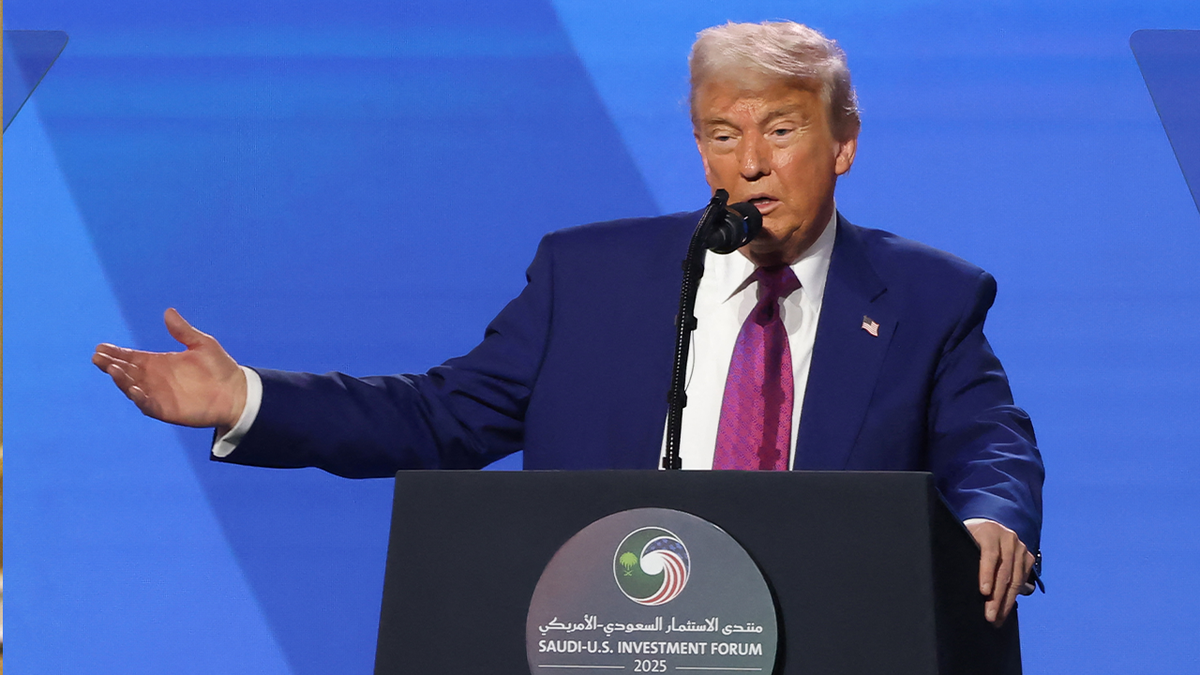
U.S. President Donald Trump speaks during the Saudi-U.S. investment forum at the King Abdul Aziz International Conference Center in Riyadh on May 13, 2025. (FAYEZ NURELDINE/AFP via Getty Images)
«We should have a full Senate debate and vote,» Murphy wrote on X. «UAE’s investment in Trump crypto and Qatar’s gifting of a plane is nuclear grade graft. An unacceptable corruption of our foreign policy.»
«Normally, arms sales go forward without a vote,» he continued. «But any Senator can object and force a full debate and Senate vote. I will do that for any military deal with a nation that is paying off Trump personally. We can’t act like this is normal foreign policy.»
In January, Sen. Chris Van Hollen, D-Md., and Rep. Sara Jacobs, D-Calif., expressed opposition to a $1.2 billion arms sale to the UAE, pointing to the country providing weapons to the Rapid Support Forces in Sudan, which the U.S. has accused of war crimes and ethnic cleansing.
TRUMP DEFENDS QATAR JUMBO JET OFFER AS TROUBLED BOEING FAILS TO DELIVER NEW AIR FORCE ONE FLEET
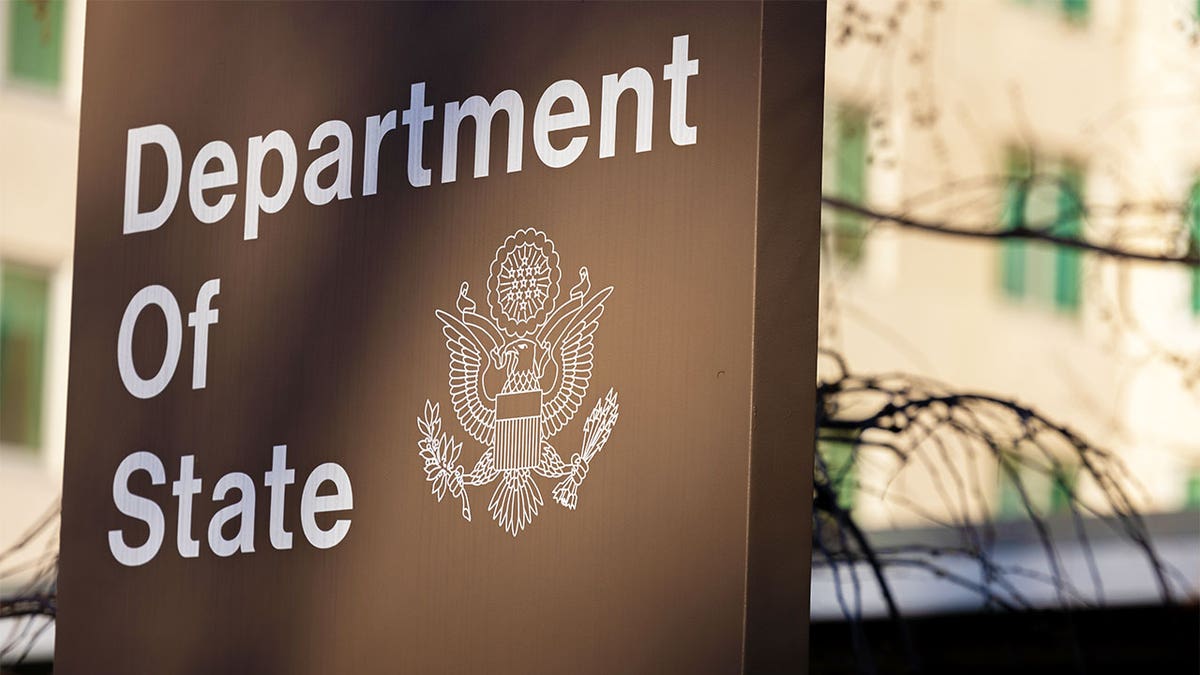
The State Department has notified Congress of the proposed sale to the UAE. (Nathan Posner/Anadolu Agency via Getty Images)
CLICK HERE TO GET THE FOX NEWS APP
Congress has previously attempted to block Trump from completing arms sales to Gulf nations, including in 2019 during his first term, when lawmakers placed holds on deals with Saudi Arabia and the UAE over concerns about civilian casualties in the war in Yemen, as the Saudi coalition has been accused of being responsible for the majority of civilian deaths.
However, Trump has invoked a provision allowing sales to go through immediately without a review period in cases considered an emergency.
INTERNACIONAL
New Jersey gubernatorial candidates gear up for competitive primary in early test of Trump’s 2nd term

New Jersey voters will choose their Democrat and Republican nominees for governor on June 10, closing out competitive primary contests that could have major implications for the Garden State.
It’s a crowded field on both sides of the aisle as six Democrats and five Republicans are vying for the chance to replace Democrat Gov. Phil Murphy, who is term-limited this year.
Democratic candidates include Newark mayor Ras Baraka, Jersey City mayor Steve Fulop, New Jersey Education Association president Sean Spiller, former New Jersey Senate president Steve Sweeney and U.S. Reps. Josh Gottheimer and Mikie Sherill.
2021 Republican gubernatorial nominee Jack Ciattarelli, radio personality Bill Spadea, New Jersey state Sen. Jon Bramnick, former Englewood Cliffs Mayor Mario Kranjac and political outsider Justin Barbera are among the Republican candidates.
DEM LAWMAKER FUNDRAISES OFF FEDERAL ASSAULT CHARGES AFTER ICE FACILITY CONFRONTATION: ‘DOING MY JOB’
Democratic Rep. Mikie Sherrill and Republican Jack Ciattarelli are among the leading gubernatorial candidates ahead of the New Jersey primary. (Getty Images)
Democrat and Republican candidates have evoked President Donald Trump’s name during their gubernatorial campaigns, as Democrats position themselves as the most anti-Trump and Republicans try to be the most pro-Trump.
REP. MIKIE SHERRILL SUGGESTS THIRD TRUMP IMPEACHMENT AS SHE CAMPAIGNS TO BE NEXT NEW JERSEY GOVERNOR
New Jersey is one of just two gubernatorial elections in 2025, along with Virginia. Both races will be used by politicians and pundits to gauge how Americans are responding to Trump’s second term ahead of the midterm elections next year.
Trump outperformed in the Garden State in 2024, according to Fox News Voter Analysis.
While Vice President Kamala Harris won New Jersey in 2024 as expected, Trump gained a nearly five-point improvement from his 2020 vote share and Harris’ support dropped by about five points. He gained across New Jersey, with his largest swings in the northeast corner of the state. Hudson and Passaic counties lead the pack.
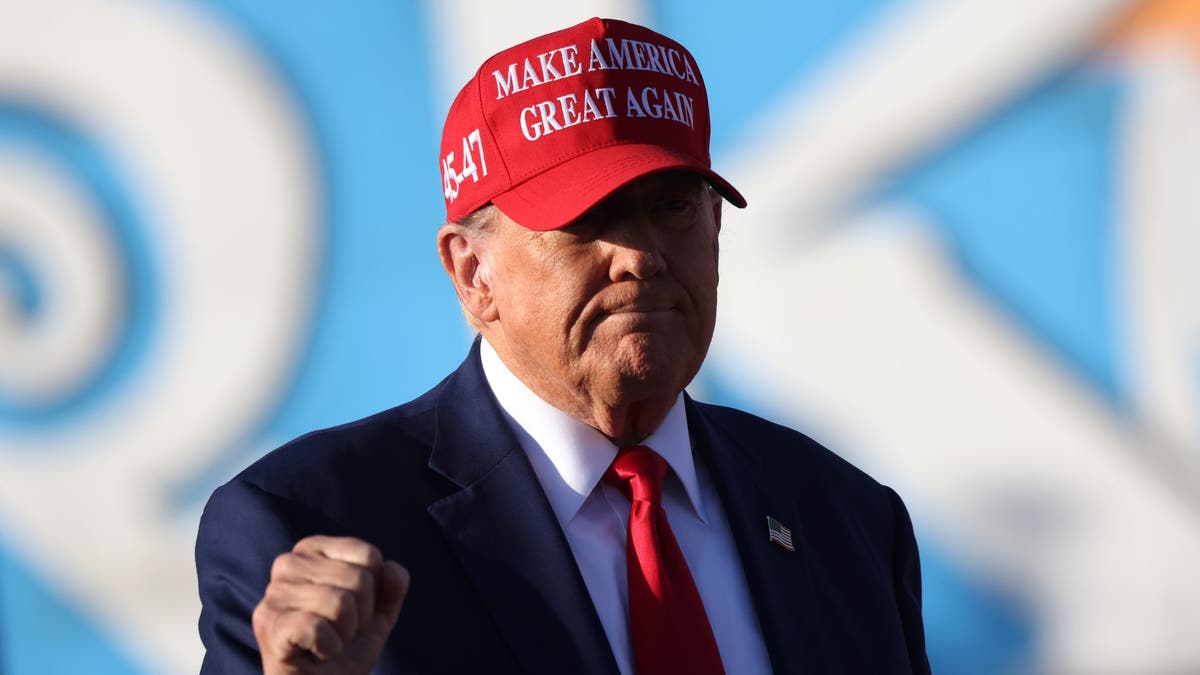
Trump arrives for his campaign rally on May 11, 2024, in Wildwood, New Jersey. (Michael M. Santiago/Getty Images)
Trump held a large «Make America Great Again» rally on the Jersey Shore during his 2024 presidential campaign as he told the crowd that New Jersey was in play, despite its reputation as a reliable blue state.
Republican gubernatorial candidates have been eager to play up their relationships with Trump and cast their campaigns as the most aligned with Trump. But the president endorsed Ciattarelli on Truth Social earlier this month – a blow to Ciatarelli’s closest competitor, Spadea.
Ciattarelli is leading the pack of Republican candidates with 42% of New Jersey registered Republicans and Republican-leaning independent voters, according to a Rutgers-Eagleton/SSRS Garden State Panel poll conducted from April 1 to April 10. Spadea comes in a distant second, with 12%. Four percent of Republicans said they preferred Bramnick, 3% chose Barbera, and no one chose Kranjac. Four percent say they don’t prefer any of the candidates.
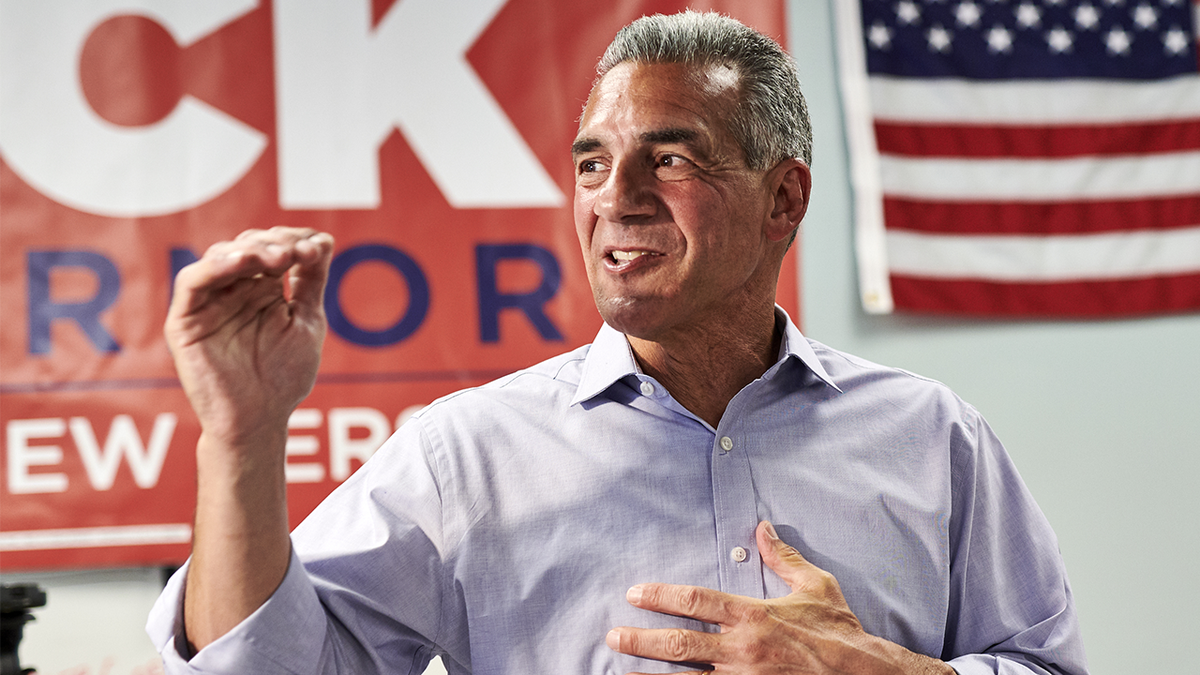
Ciattarelli landed Trump’s endorsement earlier this month. (Getty Images)
This is the leading Republican’s third consecutive gubernatorial bid. Ciattarelli lost by a hair to Murphy in 2021 and has framed his candidacy as a referendum on the Democrat policies that have driven New Jersey for the past eight years.
Meanwhile, the Democrat candidates have walked a fine line between building on Murphy’s legacy and promising to change the status quo in Trenton. Like Murphy, Democrat candidates have rejected Trump’s executive orders, crackdown on illegal immigration and Department of Government Efficiency (DOGE) cuts.
The same poll found Democrats were more split about their leading candidate. 17% of registered Democrats and Democrat-leaning independents said they prefer Sherrill and 12% said they support Fulop, which is within the margin of error. Spiller picked up 10%, Baraka had 9% and Sweeney landed 7% of the vote. Four percent didn’t prefer any of the candidates.
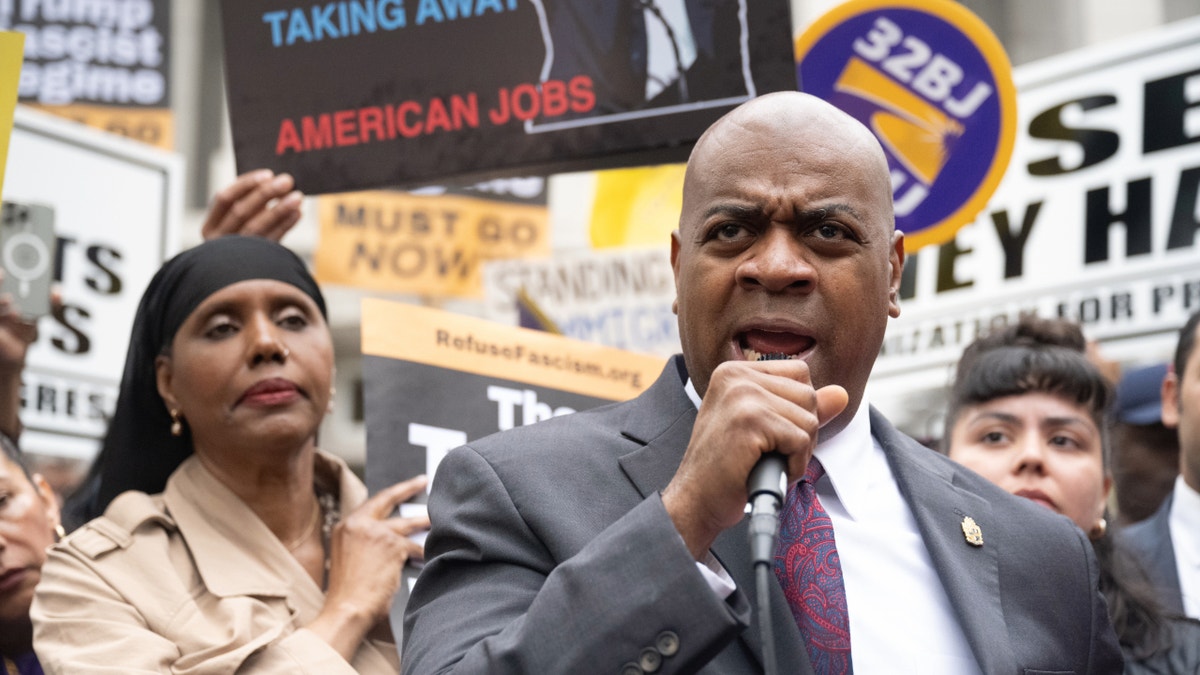
Baraka speaks after exiting a courthouse on May 15, 2025, in Newark, New Jersey. (Getty)
Democratic candidates threw their support behind Baraka this month when he was arrested for trespassing at an ICE facility in Newark. The Department of Homeland Security called it a «beyond bizarre political stunt,» but Baraka has maintained that he did nothing wrong.
As the New Jersey primary comes to a head next month, the Garden State has dominated national headlines this year. Newark Liberty International Airport (EWR) has experienced multiple FAA system outages, prompting concern among fliers and air traffic controllers.
And a New Jersey transit strike created more travel mayhem when railways closed last week. Not to mention the large sinkhole that shut down Interstate 80, redirecting even more New Jersey travelers and commuters.
CLICK HERE TO GET THE FOX NEWS APP
In-person early voting runs Tuesday, June 3, to Sunday, June 8. Vote-by-mail ballots must be postmarked by Election Day, and received by the county Board of Elections on or before the sixth day after the close of the polls. In-person voting on election day, Tuesday, June 10, will be from 6 a.m. to 8 p.m.
Fox News’ Remy Numa contributed to this report.
Politics,2025 Elections Coverage,Elections,New Jersey
INTERNACIONAL
Cómo la Universidad de Harvard se convirtió en “la escuela” del Partido Comunista Chino en el exterior

El prestigio de la Universidad de Harvard entre los funcionarios del Partido Comunista Chino (PCC) ha alcanzado tal nivel que algunos en el gigante asiático la consideran la principal “escuela del partido” fuera del país, según un comentario publicado en 2014 por el Shanghai Observer: “Si tuviéramos que clasificar las ‘escuelas del partido en el extranjero’, la que merece el primer lugar tiene que ser la Escuela de Gobierno Kennedy de la Universidad de Harvard en Estados Unidos”.
Esta percepción se ha consolidado a lo largo de décadas, durante las cuales miles de burócratas chinos de nivel medio y alto han recibido formación ejecutiva y estudios de posgrado en campus estadounidenses, siendo Harvard el destino más codiciado. No obstante, esta tradición de intercambio académico podría llegar a su fin, luego de que la administración de Donald Trump anunciara nuevas restricciones para estudiantes chinos con vínculos con el Partido Comunista.
El secretario de Estado Marco Rubio comunicó el miércoles pasado que las autoridades estadounidenses endurecerán los criterios para las solicitudes de visa provenientes de China y “revocarán agresivamente las visas de estudiantes chinos, incluidos aquellos con conexiones con el Partido Comunista Chino o que estudian en campos críticos”. Aunque la declaración no especificó cómo se evaluarán los vínculos con el partido ni qué grado de relación resultará en la revocación de visas, la medida representa un cambio significativo en la política de admisión de estudiantes extranjeros en Estados Unidos. En China, la membresía en el partido se considera un requisito habitual para el ascenso profesional tanto en el sector público como en el privado, y es casi indispensable para quienes aspiran a cargos de alto nivel.
La portavoz del Ministerio de Relaciones Exteriores de China, Mao Ning, criticó la decisión de Washington, afirmando que “la medida de Estados Unidos dañó gravemente los derechos e intereses legítimos de los estudiantes chinos”. The Wall Street Journal detalló que las presuntas conexiones con el Partido Comunista se han convertido en uno de los principales argumentos de la campaña de presión del presidente Trump contra Harvard. El pasado 22 de mayo, el Gobierno anunció la revocación de la autorización de la prestigiosa universidad para inscribir estudiantes extranjeros, acusando a la institución de colaborar con el PCC, aunque posteriormente concedió a Harvard un plazo de 30 días para impugnar la decisión. La universidad ha presentado una demanda para mantener la inscripción de estudiantes internacionales.

Algunos políticos estadounidenses sostienen que el Partido Comunista Chino aprovecha la experiencia académica en suelo norteamericano para perjudicar los intereses de Estados Unidos. Estas críticas han sido citadas por la administración Trump para justificar su esfuerzo por provocar un cambio cultural en las universidades locales, consideradas por muchos conservadores como bastiones de ideologías liberales y de izquierda.
Desde la década de 1990, las universidades estadounidenses han desempeñado un papel central en la formación de funcionarios chinos en el extranjero, en un intento de Beijing por mejorar la gobernanza mediante la exposición de sus burócratas a ideas y prácticas occidentales de políticas públicas. Además de Harvard, otras instituciones como Syracuse, Stanford, la Universidad de Maryland y Rutgers han ofrecido programas ejecutivos para funcionarios chinos, según materiales promocionales y otras fuentes citadas por The Wall Street Journal. Por ejemplo, la Escuela Maxwell de Ciudadanía y Asuntos Públicos de Syracuse colaboró en la creación de programas de posgrado en administración pública en universidades chinas a principios de los años 2000.
El fenómeno, no obstante, no se limita a Estados Unidos. El periódico señala que funcionarios chinos también han asistido a universidades de prestigio en países como Singapur, Japón y el Reino Unido. La Universidad Tecnológica de Nanyang en Singapur ha formado a miles de funcionarios chinos desde principios de los años noventa, principalmente a través de programas de posgrado conocidos popularmente como la “Clase de Alcaldes”.
La reputación de Harvard entre los funcionarios chinos se ha visto reforzada por el éxito de sus egresados, muchos de los cuales han alcanzado altos cargos en el gobierno e incluso han ingresado al Politburó del partido. The Wall Street Journal citó a observadores que consideran a Harvard una “escuela del partido” de facto, en referencia a las academias de formación del partido para burócratas prometedores.
Entre los exalumnos más destacados figura Li Yuanchao, ex miembro del Politburó y vicepresidente de China entre 2013 y 2018, quien asistió a un programa de formación para profesionales en la Escuela Kennedy de Harvard en 2002. En un discurso pronunciado en Harvard en 2009, Li recordó que su primera clase se centró en la gestión de crisis y relató cómo esa formación resultó crucial cuando tuvo que enfrentar un envenenamiento masivo en Nanjing tras su regreso a China. “Se salvaron a tiempo más de 200 vidas y el sospechoso fue capturado en 36 horas. Fuimos elogiados por la población local y el gobierno central por esto”, afirmó en su intervención. “Así que, cuando regreso hoy, quiero decir: ‘¡Gracias, Harvard!’”.

Otro caso relevante es el de Liu He, ex viceprimer ministro y principal negociador comercial de Xi Jinping en las conversaciones con la primera administración Trump, quien obtuvo una maestría en administración pública en la Escuela Kennedy de Harvard en 1995. Además, el actual miembro del Politburó y legislador de alto rango Li Hongzhong participó en un programa de corta duración en Harvard en 1999.
The Wall Street Journal indicó que, aunque la Escuela Kennedy de Harvard recibió estudiantes chinos desde la década de 1980, fue en la siguiente década cuando Beijing comenzó a enviar funcionarios de manera más organizada para recibir formación de mitad de carrera. Uno de los programas, iniciado en 1998, ofrecía becas y cursos ejecutivos a unos 20 altos funcionarios cada año.
A principios de los años 2000, Harvard lanzó el programa “Líderes de China en Desarrollo”, que permitía a funcionarios chinos participar en un curso de varias semanas dividido entre Harvard y la prestigiosa Universidad Tsinghua de Beijing. Según Harvard, el objetivo era “ayudar a preparar a altos funcionarios locales y centrales del gobierno chino para abordar de manera más efectiva los desafíos continuos de las reformas nacionales de China”. De acuerdo con boletines del Centro Ash para la Gobernanza Democrática y la Innovación de la Escuela Kennedy, el segmento de Harvard del programa incluía clases sobre gestión pública, desarrollo económico y política social, así como visitas a organizaciones gubernamentales estadounidenses.
No solo los funcionarios, sino también los hijos de altos dirigentes del Partido Comunista han estudiado en Harvard. La hija de Xi Jinping, Mingze, cursó estudios de pregrado en Harvard a principios de la década de 2010 bajo un nombre falso, aunque algunos administradores y profesores conocían su verdadera identidad. Ingresó cuando su padre era vicepresidente y líder en espera, y se graduó después de que Xi asumiera el poder.

Otros descendientes de la élite china que han pasado por Harvard incluyen a Alvin Jiang, nieto del ex líder Jiang Zemin, y Bo Guagua, hijo del ex miembro del Politburó Bo Xilai. Bo Guagua estudió en la Escuela Kennedy de Harvard entre 2010 y 2012 y obtuvo una maestría en políticas públicas. Su padre fue destituido en 2012 y condenado a cadena perpetua al año siguiente por cargos de soborno, malversación y abuso de poder.
Las conexiones de Harvard con China también han facilitado el acceso de algunos de sus académicos más destacados a altos funcionarios en Beijing. The Wall Street Journal informó que Graham Allison, ex decano de la Escuela Kennedy, ha mantenido reuniones con Xi Jinping y el ministro de Relaciones Exteriores Wang Yi durante el último año, en las que el profesor expuso sus puntos de vista sobre las relaciones entre Estados Unidos y China.
El futuro de estos intercambios académicos se encuentra ahora en entredicho tras las nuevas restricciones anunciadas por la administración Trump. La decisión de revocar visas a estudiantes chinos con lazos con el Partido Comunista podría poner fin a una era de colaboración educativa que ha influido en la formación de la élite política china y en la relación bilateral entre ambos países.
North America,Government / Politics,CAMBRIDGE
INTERNACIONAL
South Korea faces high-stakes election; fears over China, North Korea and US ties shape voter concerns

Early South Korean voters reportedly turned out in record numbers this week as the nation awaits the June 3 presidential election in what has been described as a pivotal race amid ongoing threats posed by China and recent rocky relations with the U.S. due to President Donald Trump’s tariffs.
The leader of the progressive Democratic Party of South Korea, Lee Jae-myung, is reported to be leading the race as the frontrunner, but he has raised some eyebrows after he vowed to take a «pragmatic» approach to geopolitics, chiefly by easing previously hawkish positions on China and lessening dependence on the U.S.
«The alliance with the U.S. is the foundation of South Korea’s diplomacy,» Lee said during a debate earlier this month, Bloomberg reported.
Lee Jae-myung of the Democratic Party of Korea appeals for support during a South Korean presidential election campaign in Wonju, Gangwon State, South Korea. May 30, 2025. (The Yomiuri Shimbun via AP Images)
KIM JONG UN LEFT FUMING AFTER NORTH KOREA’S NEW DESTROYER DAMAGED IN FAILED LAUNCH
Lee said the U.S.-South Korea-Japan partnership should be expanded, but he also said Seoul can’t be «unilaterally bound» to relations with Washington, particularly when it comes to U.S. geopolitical rivalries.
«We should not neglect ties with China or Russia. We need to manage them appropriately, and there’s no need to have an unnecessarily hostile approach like now,» Lee also said during the debate, the South China Morning Post reported.
Former California GOP Congresswoman Michelle Steel, who was born in South Korea, explained that China’s «bullying» behavior in the region leaves much for the global community to be concerned about.
«China [poses] the biggest threat, and they already told the whole world that they’re going to take over Taiwan,» she told Fox News Digital. «When they take over, where are they going to go [to] next? South Korea or Japan? The Philippines?
«China has been always fighting to expand.»
Foreign policy has taken center stage in the presidential race after conservative former President Yoon Suk Yeol threw the nation into political chaos after his December 2024 impeachment.
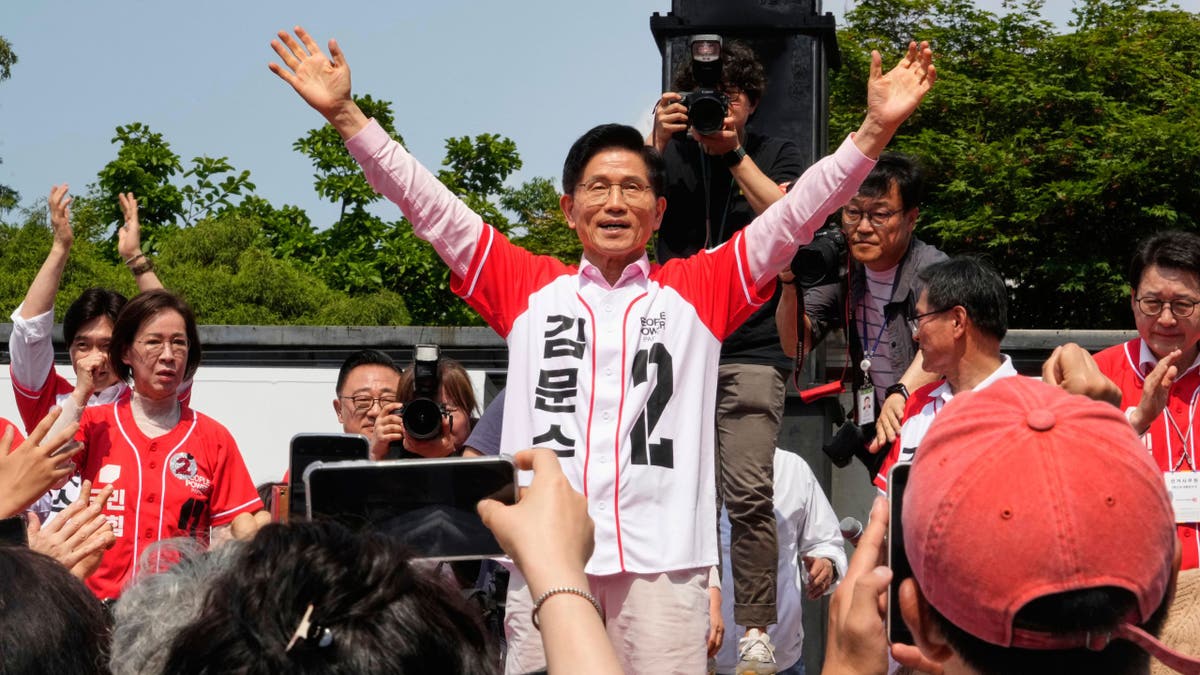
South Korea’s People Power Party’s presidential candidate, Kim Moon-soo, waves during a presidential election campaign in Seoul, South Korea, May 20, 2025. (AP Photo/Ahn Young-joon)
Yoon was ardently aligned with the U.S. when it came to opposing Chinese aggression in the Yellow Sea and East China Sea, where Beijing has been accused of expanding, militarizing and blocking freedom of navigation in contested territorial zones.
Lee’s chief challenger, Kim Moon-soo of the conservative People Power Party (PPP), a former labor minister under Yoon, pushed back on the democratic challenger’s position when it comes to China and the U.S.
But Lee has rejected the idea he is not prioritizing the U.S. alliance and reportedly said during this month’s debate, «There’s no need to worry. The South Korea-U.S. alliance is important and should continue to grow and strengthen.»
NORTH KOREA LAUNCHES SHORT-RANGE BALLISTIC MISSILES INTO SEA, SOUTH KOREA SAYS
Though he did caution that certain steps taken by the Trump administration, including the 25% tariffs announced earlier this year and the potential withdrawal of troops has «eroded» the relationship.
«If the U.S. continues this way — eroding its soft power and the trust of other nations — it won’t be sustainable. At some point, brakes will be applied,» Lee said. «Until then, endurance is key.»
Steel argued the «South Korean people understand the importance of a strong relationship with the United States.»
«Whatever the outcome of the election, South Korean leaders should embrace President Trump and look to make an incredible trade deal that will benefit everyone,» she added.
But Lee has not convinced all who are weary of his view on U.S. relations, including David Eunkoo Kim, founder and president of the Truth Forum, a conservative youth organization founded at Seoul National University.

South Korean and U.S. Marines take positions during a joint amphibious landing exercise with their Filipino counterparts on a beach facing the South China Sea in San Antonio town, Zambales province, Oct. 7, 2022. (Ted Aljibe/AFP via Getty Images)
«This election is widely seen as a pivotal moment for South Korea because the stakes — both domestically and geopolitically — are extraordinarily high,» Kim said.
«Throughout his political career, (Lee) has consistently aligned himself with both pro-North Korean and pro-Chinese agendas. He has been implicated in sending funds to North Korea in violation of U.N. sanctions, and his deference to China has been nothing short of submissive,» Kim said.
Kim was referring to Lee’s indictment for an illegal cash transfer scheme to North Korea, though Lee denies the accusations and has argued they are politically motivated.
During this month’s debate, Lee’s opponents claimed Lee is also a «North Korea risk» as concerns about Pyongyang’s military movements continue to escalate, Radio Free Asia reported.
Lee maintains he wants to ease tensions with North Korea by engaging in peaceful diplomacy.
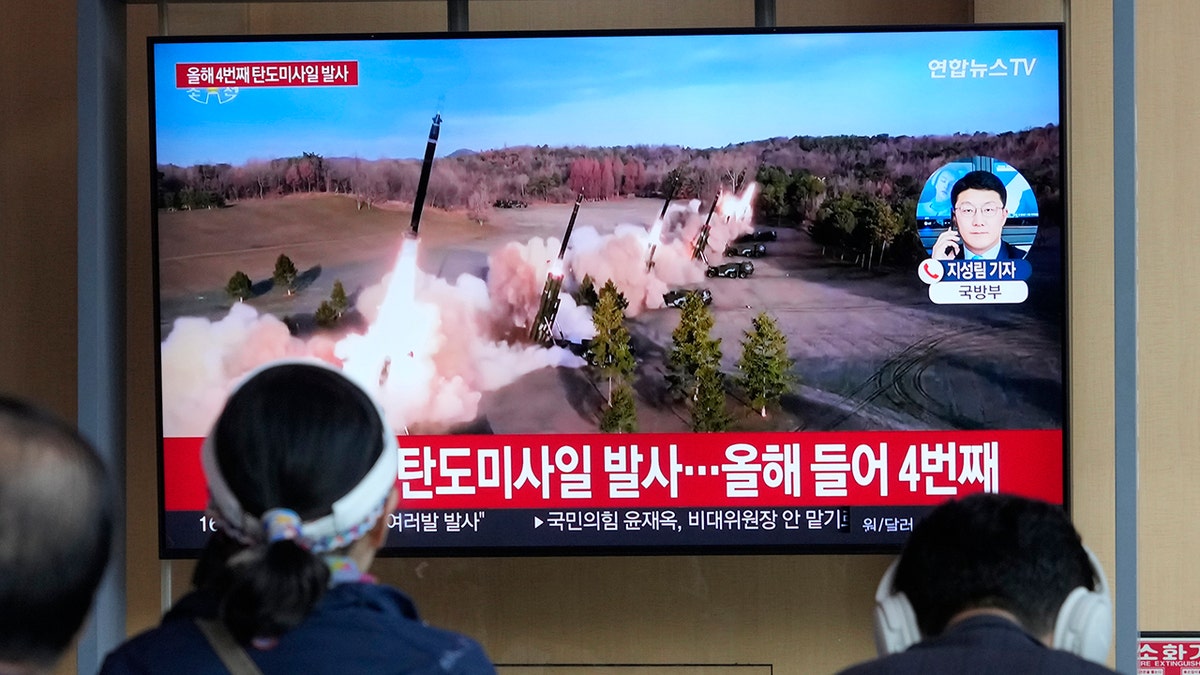
A TV screen shows a file image of North Korea’s missile launch during a news program at the Seoul Railway Station in Seoul, South Korea, April 22, 2024. (AP Photo/Ahn Young-joon)
CLICK HERE TO GET THE FOX NEWS APP
But David Eunkoo Kim told Fox News Digital Lee’s legal troubles are another geopolitical vulnerability.
«With multiple criminal investigations looming, he has every incentive to cling to power at all costs — even if that means aligning South Korea more closely with Beijing,» he said. «And this concern is not theoretical.
«China is already aggressively asserting influence in the region.»
-

 DEPORTE1 día ago
DEPORTE1 día agoA qué hora se juega el PSG vs. Inter de Milán por la final de la Champions League
-

 SOCIEDAD2 días ago
SOCIEDAD2 días agoLos famosos reaccionaron a los polémicos dichos de Diego Spagnuolo, titular de la Agencia Nacional de Discapacidad
-

 ECONOMIA2 días ago
ECONOMIA2 días agoCelebra Caputo: dos consultoras midieron la inflación de mayo por abajo del 2%, la menor en 5 años

















